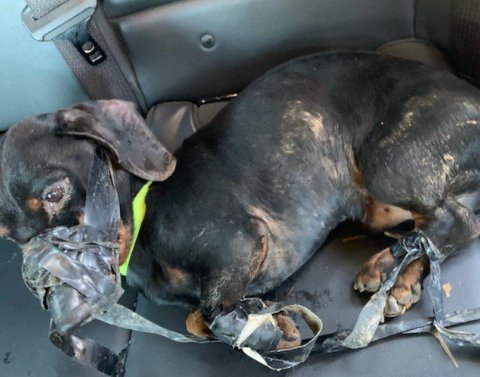This is a horrifying and heartbreaking situation. The fact that someone intentionally bound a defenseless animal, left it to suffer, and likely intended for it to die represents an extreme case of animal cruelty.
Here is a breakdown of the information typically associated with such cases and what happens next:
The Act Itself: A Severe Crime
-
Intentional Cruelty: Binding a dog’s muzzle prevents it from barking, eating, or drinking. Tying its feet prevents it from moving or escaping. Using tough material like electrical tape ensures the bindings are tight, painful, and difficult to break free from.
-
The Outcome: Without intervention, the animal would die from dehydration, starvation, hyperthermia, or suffocation. It is a deliberate act of torture and attempted killing.
Immediate Aftermath and Recovery
-
Discovery and Rescue: The dog was likely found by a passerby, utility worker, or law enforcement. The first responders would have carefully cut the tape away to avoid causing further injury.
-
Veterinary Care: The dog would be rushed to a veterinary clinic or animal hospital for emergency treatment. This would include:
-
Medical Assessment: Checking for dehydration, starvation, wounds from the tape, skin infections, and paw damage from lack of circulation.
-
Treatment: Providing fluids, nutrients, pain medication, and treating any wounds or infections.
-
Behavioral Assessment: The dog will likely be traumatized, fearful, and anxious. Vets and behaviorists will work to build trust.
-
The Legal and Investigative Process
-
Animal Cruelty Charges: This is a felony-level crime of animal cruelty or torture in all 50 U.S. states and many other countries. The person responsible faces significant jail time, fines, and a permanent ban on owning animals.
-
Investigation: Animal control officers and law enforcement will investigate. They may:
-
Look for security camera footage from nearby homes or businesses.
-
Canvas the area for witnesses.
-
Ask the public for tips regarding anyone who may have recently owned or been seen with a dog matching this description.
-
-
Reward: Animal welfare organizations (like the ASPCA or Humane Society) or local donors often post a substantial reward for information leading to the arrest and conviction of the perpetrator.
How the Public Can Help
If you were to come across a news story like this, here’s how you can assist:
-
Contact Authorities: If you have any information—no matter how small—about who might have done this, contact the investigating agency immediately. This is often a local animal control office or police department.
-
Donate: The cost of the dog’s emergency medical care and ongoing rehabilitation can be very high. Donating to the animal shelter or rescue organization caring for the dog can make a huge difference.
-
Share Responsibly: Sharing the official news story or post from the animal shelter on social media can help find leads. However, be cautious not to share graphic images unnecessarily, as this can be distressing and exploitative.
A Note on Naming and Adoption
-
Dogs rescued from such severe circumstances are often given symbolic names by their rescuers (e.g., “Hope,” “Trooper,” “Lucky”).
-
After recovery, the dog will need a very specific, patient, and loving home. Reputable rescues will carefully vet potential adopters to ensure the dog goes to a quiet, experienced home where it can continue to heal.
This kind of story is shocking, but it often also brings out the best in people, with communities rallying to support the victimized animal and demand justice. The hope is always that with intensive medical and behavioral care, the dog can recover and learn to trust humans again.
